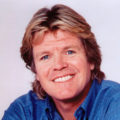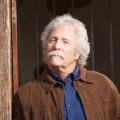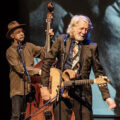Denny Laine chats British Invasion’s 50th, Wings with Paul McCartney and early Moody Blues
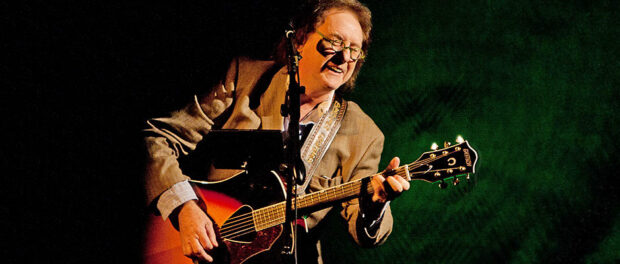 Photo provided by Jay Gilbert
Photo provided by Jay Gilbert
Being an integral member of one monumental act is something many artists rarely, if ever, achieve. Though, in the case of Denny Laine, the lightning rod of success struck time and time again. For starters, the singer/songwriter/guitarist was involved in the initial incarnation of The Moody Blues, singing lead on the group’s first ever hit “Go Now” and extensively contributing to the band’s 1965 debut album “The Magnificent Moodies.” From there, he flirted with solo life via the smash “Say You Don’t Mind,” started the Electric String Band (who opened for Jimi Hendrix with The Beatles in attendance), dabbled in Balls alongside Trevor Burton (of The Move), followed by a stint in Ginger Baker’s Air Force (led by the Cream/Blind Faith drummer and also featuring a budding Steve Winwood).
As if that wasn’t extraordinary enough, the best was yet to come when Laine joined Paul McCartney in Wings, writing, playing and sometimes singing on eight albums (five of which topped the charts) and remaining the only constant member (outside of Macca and his wife Linda) throughout its entire decade-long duration. Though the group has no plans to reunite, the band is experiencing a resurgence of sorts thanks to remastered CD, vinyl and box set editions of classic collections “Band On The Run,” “Venus And Mars,” “Wings At The Speed Of Sound” and “Wings Over America” as part of the Paul McCartney Archive Collection.
It’s no wonder why he’s considered rock n’ roll royalty in so many circles and an ideal addition to the brand new British Invasion 50th Anniversary Tour, which also features popular peers like Peter Asher (of Peter & Gordon), Chad & Jeremy, Billy J. Kramer, Mike Pender’s Searchers and Terry Sylvester (of The Hollies). Catch more from Laine himself during this career-spanning phone conversation with Chicago Concert Reviews in anticipation of a City Winery stop on Saturday, March 7.
“Paul asked me to join the band because he knew me. He knew he wasn’t going to have problems with [me like he might with] strangers or people who were in awe of him because he was in The Beatles…”
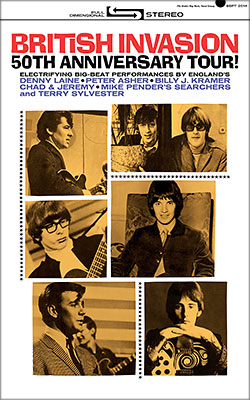 Why do you think the British Invasion era continues to endure?
Why do you think the British Invasion era continues to endure?
Denny Laine: Everybody for the last 50 or 60 years was brought up on this music from radio, TV and ads. It’s all over the place. Parents brought their kids up on this music and they brought their grandchildren up on this music now, so that’s why it’s stayed around. The fact is there were also a lot of bands out there in those days [who weren’t] relying on the recording studios. The bands were really hard working road bands that worked every night. That whole era was just full of that kind of music in the clubs and in the dance halls…It was almost like a renaissance in music and that’s why I think it was so important and why it’s been remembered.
How did the idea of staging this tour come about?
Laine: Well, I’m not sure that I’m the person to answer that because it was put together originally by a guy called Andrew Sandoval and Keith Putnay, who’s an agent and manager for Peter Asher. Andrew is a great collector and connoisseur of the old music. He used to work for Rhino Records and did a lot of compilations of old songs and put them out on CD. Obviously in connection to all the tracks and being a fan of all that music, it’s just something he’s always wanted to do.
There are a lot of great groups on the show. What’s the format going to be?
Laine: Everybody has their own sets. I don’t like to give it all away and that’s all I’m gonna say on all that. Of course, it’s just one band backing, but everybody has their own sets.
What will your set focus on?
Laine: I’ve never done a ’60s tour before. Since The Moody Blues do qualify as a ’60s band, that’s the material that I’m doing on this show. I don’t want to give all the songs away, but it will be from the first Moody Blues album and a couple of things that I did on my own.
“The Magnificent Moodies” is turning 50 this year. How are you celebrating this landmark anniversary?
Laine: [Bruce Springsteen & The E Street Band member/music supervisor] Steven Van Zandt asked if he could use “Go Now” in a David Chase film called “Not Fade Away” and he contacted me or us to see if he could use the song. We didn’t know that we had access to those recordings because we thought we lost them to the old management, who basically took all our money and ran away. And finally we found out that those tracks had reverted back to us, so we managed to get a hold of all the tapes and that’s when Cherry Red Records remastered everything, put it together and now the box set is out. In fact, Steven Van Zandt has been talking about doing a one-off show of that album featuring a lot of guests, but that’s all in the future. That’s all out now and ties into me doing this tour, which is perfect timing.
What did you think of Simply Red’s version of “Go Now” a few years ago?
Laine: Well, I didn’t mind it. I kind of liked it. It was not a 3/4 timing. It was like a rock version, which is the best way to do [a new version]. I think it shows the innovation of the band and I like artists who do that, like when Joe Cocker did “With A Little Help From My Friends.” And I also liked Ozzy Osbourne’s version of it. It’s not my song. [It was originally recorded by Bessie Banks]. We still did it in the same timing of the original, but they did their own versions.
A few years later you joined Ginger Baker’s Air Force. Why didn’t the group continue beyond such a short window of just two albums?
Laine: I always liked Ginger, and although he was a very, very positive person, he was having a few health problems, so we put it on hold for a little while and thought it was going to start up again but it never did. There were 15 people in that band and they all wanted to make a living and I think they went off and did other things.
What are you most proud of from the band’s recordings?
Laine: I don’t like the word “proud.” I mean, I enjoyed the process of playing with all those great musicians, but I think it was a little chaotic. It was gonna take a little bit of time for it to get really good and we didn’t give it enough time for it to get really tight. Like with Wings, we took a long time before we went out and started playing live. But the Ginger thing, you couldn’t afford to do it like that. So we were out there almost not that well rehearsed and it was a lot of jamming and a lot of solos and stuff like that. But of course, when I did “Man Of Constant Sorrow”—we recorded that live at Royal Albert Hall in London—that was kind of more the direction I wanted to go, which is more songs, not just a 15-piece band having loads of solos…
You mentioned Wings being really prepared to play live. What was going through your mind right before you stepped on the stage with that band for the very first time?
Laine: You’ve got me a little bit there because I can’t remember to be honest. I’m pretty sure it was a university show date. We just jumped in a van and took off and just found the venues every day. We drove to universities because we knew there would be a crowd there. We rehearsed our show, but we weren’t that used to being in front of an audience…I think it was just a matter of remembering all the parts. I think the person that was the most nervous was Linda. And the second person who was most nervous was Paul because he was carrying her kind of and didn’t want her to make a fool of herself…The crowd was very enthusiastic and it wasn’t meant for anything other than just a band getting together and seeing what it sounds like. There was no pressure on us, that’s what I can remember.
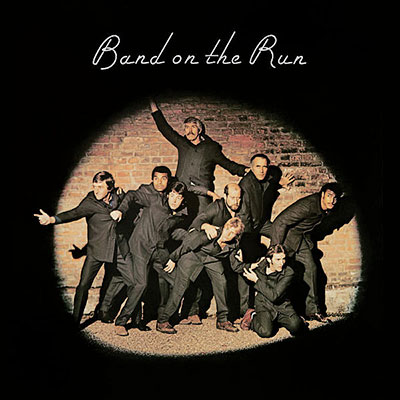 In your early conversations with Paul about working together, do you feel like there was a certain amount of pressure for him coming off The Beatles? Or was Wings really treated as its own thing from scratch without those comparisons?
In your early conversations with Paul about working together, do you feel like there was a certain amount of pressure for him coming off The Beatles? Or was Wings really treated as its own thing from scratch without those comparisons?
Laine: There couldn’t be any comparison because it wasn’t The Beatles and we weren’t doing any Beatles songs. We were determined not to come across as a tribute band. We were determined not to try to come across like we were trying to replace the Beatles. I would not have been in a band like that. I was just happy to be in a band where all the material was original, although in retrospect, I didn’t put as much into it as I should’ve songwriting wise. I could’ve written a lot more, but tended to leave it to Paul. He encouraged me to do some writing because in the Moodies I was doing a lot of writing, but I just didn’t get around to it so much with Paul. I was just busy doing other stuff I suppose, whereas he’s always been a prolific songwriter. But at least it was original stuff and each album had a different style to it and different members. Everything was on the up, and although it was scrutinized by the public, it was all very confident within the camp. We all knew what we wanted to do and it was successful. For Paul, more than me, I think that was a bigger feeling of relief because he originally thought it was going to be compared to The Beatles, but then again, The Beatles were never a touring band anyway. They did a very small amount of touring. And we took it to the next level, you know? I think we and Led Zeppelin really cornered the market on that level of doing the big arenas.
The Moodies and the Beatles used to tour together in the UK, right?
Laine: We did do the second British tour, yeah. We’d known The Beatles as friends and we knew each other from the clubs. I’d already done a show with them before I even joined The Moody Blues…So I mean we we’re friends of theirs. They came to London the same time as we did—well, we came a bit after them—and we all got friendly. [The Moodies] eventually went with [Beatles manager] Brian Epstein. We didn’t really need any management at that time. We just needed work. We ended up going on various shows with Gerry & The Pacemakers, Billy J. Kramer and all those people Brian managed. We ended up going from that to going with The Beatles and being on their tour…Paul asked me to join [Wings] because he knew me. Paul asked me to join the band because he knew me. He knew he wasn’t going to have problems with [me like he might with] strangers or people who were in awe of him because he was in The Beatles…
Is there anything you’d like to share about your time with Wings that you don’t get asked about all that often?
Laine: Well, you know, it’s pretty much been covered. I mean that’s the problem. There isn’t much people don’t know about that was going on in that band. All I could say is I spent a lot of time socially with them in one sense because I used to go and write with Paul, not within the band’s structure. We would go somewhere—to one of his houses or to my house or Spain or something—and really just go away and write and do things. That way it was more of a family affair. Even on the road, he took his family and I did sometimes and then we had our own lives outside [the band]. We would only take like two or three months off a year, if that, to just do our own thing, but as I said, during those time periods, I would spend a lot of time in Scotland or wherever writing with Paul. So I still was involved in that whole thing even though we weren’t necessarily working as a band. Most bands are together all the time 24/7, whereas we weren’t. We had separate lives and we went home most of the time. I think that was a great thing. We could afford to do that. Most bands can’t afford to do that. They’re just always trying to stick together to get more work, to make more money and be able to stay together and then they’ve got pressure from the record label saying get to the studio…We didn’t necessarily have that. We had the luxury of being able to choose more.
What additional perspective have you gained from all the recent Wings remasters?
Laine: I don’t know. I think there’s more of an awareness of my involvement because I haven’t really worked that much over the years. I don’t go out all the time like a lot of people do and just work, work, work. I spent the first ten years of not being in Wings just being in recording studios and I never really got my name out there as a solo artist. Well now that these albums are being re-released, I’m getting a lot more feedback because of that. I think it’s also bringing a lot of new fans. A lot of those original albums weren’t that well known by a lot of the younger people, whereas the younger people are coming now, so that’s an addition to the whole thing. Well because of that, I’ve started to work a lot more and I’m enjoying playing live, so that’s a good thing for me. I didn’t really want to get out there and not have a really good show, so it’s taken me a while to get to this stage where I’m enjoying playing because I’ve got good musicians who know my material now. It’s not just one band. It’s a collection of musicians that I use for different shows in different parts of the county. I think the re-releases help to bring more of a crowd.
Do you have any solo projects you’re currently working on?
Laine: Yes, of course I do. I’ve got a new album I’ve had sitting on the shelf for a couple of years that’s about to come out. It’s called “Valley Of Dreams” and I’m trying to put it out on vinyl because I want it to be a conscious album. It’s an English person’s point of view of American musical influences. I put those songs together to represent those styles that I like and it’s a travelogue across America from an Englishman’s point of view, so the songs go from place to place and different styles and influences. I’ve also got an environmentally-themed musical project for the stage called “Arctic Song,” and it’s primarily about the north and the problems of the ozone layer and then it sort of covers the rest of the world later on in the musical. I call it a sort of space odyssey meets the environment problems of the earth…I’ll be doing different types of shows, and then with this musical, I’ll be involved in all the directing and producing and all the back room stuff and I’m trying to put that together. Having new material is a very important thing for me.
Denny Laine performs as part of The British Invasion 50th Anniversary Tour at City Winery on Saturday, March 7. For additional details, visit www.britishinvasiontour.com and www.citywinery.com/chicago/.




